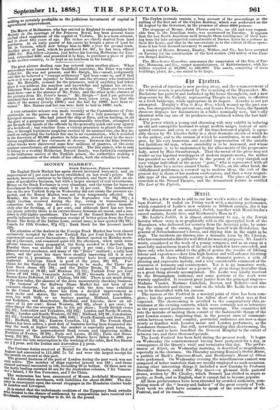Muir.
We have a few words to add to our last week's notice of the Birming- ham Festival. It ended on Friday week with a morning performance, which consisted of Leslie's new oratorio or Biblical cantata, (for it has not the dimensions of an oratorio,) Judith, together with Mendelssohn's sacred cantata, Laude Sion, and Beethoven's Mass in C. Mr. Leslie's Judith, it is almost unnecessary to say, is the Jewish heroine whose story is so graphically told in the apocryphal book of the Maccabees, who delivered her country from the Assyrian yoke, by enter- ing the camp of the enemy, ingratiating herself with Holofernes, the general of Nebuchadnezzar's forces, and slaying him in the night as he slept. The incidents are thrown into a dramatic form by Mr. Chorley, who has constructed a libretto well fitted for musical purposes. Mr. Leslie's music, considered as the work of a young composer, and as an essay in a most lofty and arduous branch of the art in which few have succeeded, and those only who have added to the gifts of genius the results of lifelong labour and experience—does him high honour and will enhance his rising reputation. It shows boldness of design, dramatic power, a vein of pleasing and expressive melody, and a very considerable command of the resources of harmony and counterpoint. Yet it is an immature work, and must be regarded rather as a promise of great things hereafter than as a great thing already accomplished. Mr. Leslie was kindly received by the Birmingham audience, and some portions of the work were warmly applauded. It received great justice from the principal singers— Madame iardot, Madame Castellan, Reeves, and Belletti—and also from the orchestra and chorus ; and on the whole Mr. Leslie has no rea- son to be dissatisfied with his success.
The success of the Festival in a musical point of view has been com- plete; but the pecuniary result has fallen short of what was at first expected. The shortcoming is ascribed to the comparatively thin at- tendance at the evening concerts, which were certainly not so attractive as the great sacred performances in the mornings. The committee fell into the mistake of making them consist of the fashionable things of the past London season ; forgetting that, in the present state of communi- cation between town and country, provincial audiences are now-a-days nearly as familiar with London music and London performers, as the Londoners themselves. But still, notwithstanding this shortcoming, the Festival is said to have benefited the General Hospital to the extent of between two and three thousand pounds.
The Leeds Festival has been held during the present week. It began on Wednesday (its commencement having been postponed for a day, in consequence of the Queen's visit) and terminates this day. The perfor- mance of _Elijah, on Wednesday morning, is described as magnificent, especially in the choruses. On Thursday morning Rossini's Stabat Mater, a portion of Bach's Passions-Musik, and Beethoven's Mount of Olive* were performed. On Wednesday evening the miscellaneous concert was composed of better materials than are usually employed oi such occasions. Among other interesting things it included a new Cantata by Professor Btemdale Bennett, called The May Queen—a pleasant little pastoral drama, written by Mr. Chorley, which Bennett has clothed in music so pretty, so fresh, and so English, that it cannot fail to become popular.-
All these performances have been attended by crowded audiences, com- prising much of the "beauty and fashion" of the great county of York. Next week we shall have occasion to speak of the conclusion of the Festival, and of its results.


























 Previous page
Previous page